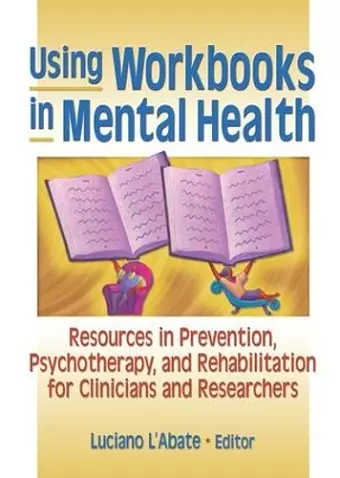Using Workbooks in Mental Health
Resources in Prevention, Psychotherapy, and Rehabilitation for Clinicians and Researchers
Format:Paperback
Publisher:Taylor & Francis Inc
Published:7th Jul '04
Currently unavailable, and unfortunately no date known when it will be back
This paperback is available in another edition too:
- Hardback£41.99(9780789015938)

The use of workbooks in therapy might represent one of the biggest breakthroughs that has occurred in decades.
Using Workbooks in Mental Health: Resources in Prevention, Psychotherapy, and Rehabilitation for Clinicians and Researchers examines the effectiveness of mental health workbooks designed to address problems ranging from dementia and depression to addiction, spousal abuse, eating disorders, and more. Compiled by Dr. Luciano L’Abate, a leading authority on mental health workbooks, this resource will help clinicians and researchers become aware of the supportive evidence for the use of workbooks.
Using Workbooks in Mental Health examines workbooks designed to specifically help:
- clients affected by dementia or depression
- abused women
- gambling addicts
- women who have substance-abuse addictions
- incarcerated felons
- couples preparing for marriage
- children with school refusal disorder
- and more!
An essential reference for mental health professionals, graduate students, administrators, and researchers, Using Workbooks in Mental Health also explores the role of workbooks in psychological intervention over the past decade. Although workbooks are not yet part of the mainstream of psychological intervention, they are growing in popularity as their many advantages are recognized. They are easy to use by almost any client, they are cost-effective to both therapist and client in terms of money and time, they provide therapists with written assignments to use as homework for individuals, couples, and families, and they can be used in any setting, especially in computer-assisted offline or online interventions.
In addition, this book shows how workbooks can be used to administer therapy to previously unreachable clients such as:
- people who are reluctant to talk to an authoritative figure or a stranger
- people who cannot afford face-to-face treatments
- incarcerated offenders who have not been helped by talk therapies
- Internet users who are searching for help via computer rather than in person <
"OUTSTANDING... This book expertly reviews the strengths as well as the limitations of self-directed workbooks. A MUST-READ for all levels of the professional community and for the ever-growing collection of self-help groups seeking to meet the problems of human development."Patrick W. Corrigan, PsyD, Professor of Psychiatry and Executive Director, University of Chicago Center for Psychiatric Rehabilitation "AT LAST, A SOURCE OF SPECIFIC SUGGESTIONS... CAN HELP CLINICIANS extend the work and influence of therapy through engaging patients outside their offices visits." Arthur M. Bodin, PhD, ABPP, ABI, Senior Research Fellow, Mental Research Institute, Palo Alto, California; Clinical Professor, Department of Psychiatry, UCSF School of Medicine
ISBN: 9780789015945
Dimensions: unknown
Weight: 635g
428 pages